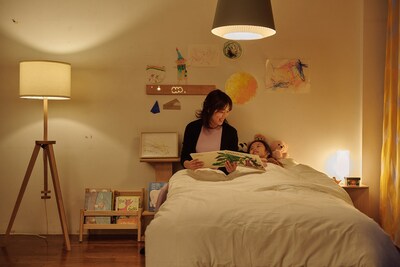- At present, 66% of Americans sleep while having their smartphones in the bedroom
- Emma and mui Lab want to create the ultimate sleep environment — by replacing smartphones with mui Lab's disappearing wooden touch interface
- The wooden touch interface will be invisible — except when interacted with
- The two brands plan on launching the smart products for better sleep featuring mui's "Calm UI" and Emma's award-winning bed in late-2023
LAS VEGAS, Jan. 3, 2023 /PRNewswire/ -- Today at CES 2023, Emma — The Sleep Company and mui Lab, Inc., the Kyoto-based Calm Technology startup, announced their partnership. The two award-winning brands plan on developing a smart product within the sleep space featuring a wooden touch interface. The interface brings a calm sleep experience to the bedroom and enables people to leave their cellphone outside of a space meant for sleep. CES is known as the most influential technology showcase in the world, and a global stage for innovation. This unprecedented advancement to the bedroom ensures CES 2023 will be no exception.
95% of people use smartphones immediately before sleep, and many bring their devices into bed as well. Factors such as the smartphone's blue light have been proven to negatively affect sleep. (*) The two companies aim to develop a smart, yet calm bedroom product that allows everyone to take back control of their sleep, by enabling people to customize their bedroom experience — including lights, temperature, alarm and music — all from a wooden touch interface that is only visible when the information is needed.
"After an amazing 2022, Emma — The Sleep Company is starting 2023 in the best-possible way: improving the overall sleep experience by pursuing a partnership with mui Lab," said Manuel Müller, CEO & Co-Founder of Emma. "As a sleep tech company, innovation is at the core of everything we do. Through this latest innovation with mui Lab, we plan on further enhancing people's sleep experience by taking cellphones out of the bedroom — which are proven to be detrimental to sleep quality."
Emma – The Sleep Company, the world's leading D2C brand, is focused on creating the best possible sleep experience in the world for everyone. With its own in-house test laboratory, Emma has successfully launched more than sixty award-winning products to date.
mui Lab develops IoT products and is mainly focused on smart homes, with the philosophy of Calm Technology. A wooden smart home controller, the mui Board, is their signature product, that delivers calm and peace of mind. In 2019, the mui Board won the CES Innovation Award in the Smart-Home category, and the mui Smart Home Platform won its award in the 2022 Smart-Home category
At CES 2023, representatives from both companies will be present in Booth #50027. Customers can register their interest in the new product at the booth or by visiting this link.
NOTE (*): Refer to the source below:
Poor sleep outcomes have been increasingly associated with smartphone usage in the hours leading up to bedtime.
Electronic devices such as smartphones, computers, and TVs emit a large quantity of blue light, which tricks your body into believing it is still daytime. This is why many smartphone manufacturers have started to promote the use of night shift functions, which shift the colors on your screen toward the warmer end of the spectrum and thus reduces your exposure to blue light in the evenings to improve your sleep quality[1].
However, blue light is only one part of the equation when it comes to phone use and sleep. When you lay down at night, you should ideally feel calm and relaxed. Strong emotions – both positive and negative – are not conducive to falling or staying asleep.
Unfortunately, many common activities on your smartphone are designed to elicit those exact emotions. Social media, games, and video streaming are all psychologically stimulating and can linger in your mind long after you put your phone away for the night. Using social media before bed is associated with lower sleep quality[2] [3], increased daytime sleepiness[4], and poor mental health outcomes[5], but for many of us, the temptation to have "one last look" at our feed can be overpowering.
It's a slippery slope: even if you are not intending to do so when you first pick up your device, you may find it difficult to resist the pull of other, more engaging apps when you go to set your morning alarm, check tomorrow's weather, or jot down a quick note. Using alternative tools to accomplish these common evening tasks may make it easier to stick with your sleep hygiene goals by allowing you to eliminate the phone from your evening routine altogether and removing opportunities for temptation.
[1] Shechter, Ari, et al. "Blocking Nocturnal Blue Light for Insomnia: A Randomized Controlled Trial." Journal of Psychiatric Research, vol. 96, Jan. 2018, pp. 196–202, https://doi.org/10.1016/j.jpsychires.2017.10.015.
[2] Levenson, Jessica C., et al. "Social Media Use Before Bed and Sleep Disturbance Among Young Adults in the United States: A Nationally Representative Study." Sleep, vol. 40, no. 9, Sept. 2017, p. zsx113, https://doi.org/10.1093/sleep/zsx113.
[3] Orzech, Kathryn M., et al. "Digital Media Use in the 2 h before Bedtime Is Associated with Sleep Variables in University Students." Computers in Human Behavior, vol. 55, Feb. 2016, pp. 43–50, https://doi.org/10.1016/j.chb.2015.08.049.
[4] Fossum, Ingrid Nesdal, et al. "The Association Between Use of Electronic Media in Bed Before Going to Sleep and Insomnia Symptoms, Daytime Sleepiness, Morningness, and Chronotype." Behavioral Sleep Medicine, vol. 12, no. 5, Sept. 2014, pp. 343–57, https://doi.org/10.1080/15402002.2013.819468.
[5] Scott, Holly, and Heather Cleland Woods. "Understanding Links Between Social Media Use, Sleep and Mental Health: Recent Progress and Current Challenges." Current Sleep Medicine Reports, vol. 5, no. 3, Sept. 2019, pp. 141–49, https://doi.org/10.1007/s40675-019-00148-9.
SOURCE Emma - The Sleep Company


